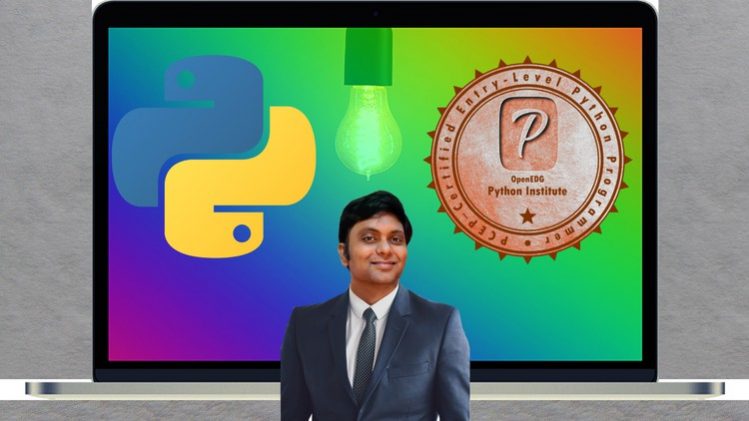
Python Entry Level (PCEP) Exam – Mock Tests
Practice for PCEP type of Questions and be ready for exam
Practice for an entry-level Python Programmer in Python
Prepare for PCEP-30-01 exam with 180 Questions
Contains practice tests similar to PCEP (Certified Entry-Level Python Programmer).
Students will become confident in clearing PCEP-30-01
Helps students to get more than 70% in PCEP actual exam.
The practice test will also help students to clear 98-381 -Microsoft Python Certification Exam.
Explanations are provided for all the Questions for the practice test.
The practice tests will definitely help you to improve your PCEP exam score.
This Python certification Course(practice test) consists of 180 questions that will test your knowledge and will help you to clear the PCEP – Certified Python Entry-Level Programmer exam(PCEP-30-01).
The actual Python PCEP certification will have 30 questions as mentioned below-
1. Exam block #1: Basic Concepts (17%)
Objectives covered by the block (5 exam items)
fundamental concepts: interpreting and the interpreter, compilation and the compiler, language elements, lexis, syntax and semantics, Python keywords, instructions, indenting
literals: Boolean, integer, floating-point numbers, scientific notation, strings
comments
the print() function
the input() function
numeral systems (binary, octal, decimal, hexadecimal)
numeric operators: ** * / % // + –
string operators: * +
assignments and shortcut operators
2. Exam block #2: Data Types, Evaluations, and Basic I/O Operations (20%)
Objectives covered by the block (6 exam items)
operators: unary and binary, priorities and binding
bitwise operators: ~ & ^ | << >>
Boolean operators: not and or
Boolean expressions
relational operators ( == != > >= < <= ), building complex Boolean expressions
accuracy of floating-point numbers
basic input and output operations using the input(), print(), int(), float(), str(), len() functions
formatting print() output with end= and sep= arguments
type casting
basic calculations
simple strings: constructing, assigning, indexing, immutability
3. Exam block #3: Control Flow – loops and conditional blocks (20%)
Objectives covered by the block (6 exam items)
conditional statements: if, if-else, if-elif, if-elif-else
multiple conditional statements
the pass instruction
building loops: while, for, range(), in
iterating through sequences
expanding loops: while-else, for-else
nesting loops and conditional statements
controlling loop execution: break, continue
4. Exam block #4: Data Collections – Lists, Tuples, and Dictionaries (23%)
Objectives covered by the block (7 exam items)
simple lists: constructing vectors, indexing, and slicing, the len() function
lists in detail: indexing, slicing, basic methods (append(), insert(), index()) and functions (len(), sorted(), etc.), del instruction, iterating lists with the for loop, initializing, in and not in operators, list comprehension, copying and cloning
lists in lists: matrices and cubes
tuples: indexing, slicing, building, immutability
tuples vs. lists: similarities and differences, lists inside tuples and tuples inside lists
dictionaries: building, indexing, adding and removing keys, iterating through dictionaries as well as their keys and values, checking key existence, keys(), items(), and values() methods
strings in detail: escaping using the character, quotes, and apostrophes inside strings, multi-line strings, basic string functions.
5. Exam block #5: Functions (20%)
Objectives covered by the block (6 exam items)
defining and invoking your own functions and generators
return and yield keywords, returning results,
the None keyword,
recursion
parameters vs. arguments,
positional keyword and mixed argument passing,
default parameter values
converting generator objects into lists using the list() function
name scopes, name hiding (shadowing), the global keyword
PCEP Certification: Exam Information
- Exam Name: PCEP Certified Entry-Level Python Programmer
- Exam Code: PCEP-30-01
- Exam Level: Entry
- Pre-requisites: None
- Duration: 45 minutes (exam) + approx. 5 minutes (Non-Disclosure Agreement/Tutorial)
- Number of Questions: 30
- Format: Single-choice and multiple-choice questions, drag & drop, gap fill | Python 3.x
- Passing score: 70%
- Language: English
- Full Exam Price: USD 59
- Delivery Channel: OpenEDG Testing Service
- Testing Policies: Click here to view Testing Policies
- Exam Syllabus: Click here to view the Exam Syllabus
PCEP certification is a professional Entry-Level Python Programmer Exam to test a person’s ability to understand basic coding related to Fundamentals of Python Programming. The candidate should have basic knowledge of basic Python Programming, its syntax, semantics, and basic concepts like the below –
- Basic concepts like – literals, print(), input(), numbers, strings, etc.
- Basic knowledge of operators – unary, binary, bitwise, boolean, relational operators, simple strings, data type, evaluation, I-O, etc.
- Control Flow – Loops, If, While, for, break, continue, pass
- Basic data collections – Lists, tuples, dictionaries, strings
- Functions – Arguments, Parameters, recursion, scope, global, positional arguments, Keyword arguments, None, yield, default parameter, etc.
Other benefits of the PCEP course
- This course will also help you to build your Python Projects.
- The course will be of great help for students who want to clear Microsoft 98-381 exam for Python.
- This course will also test you if you are ready to start your reparation for PCAP.






